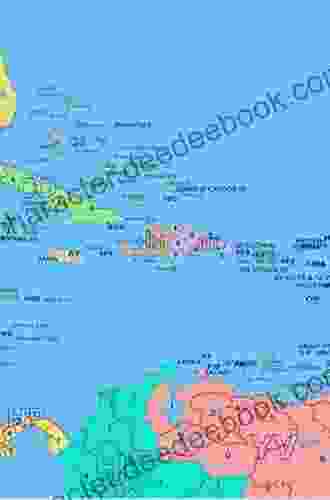Salt in Eastern North America and the Caribbean: A Historical and Cultural Exploration


Salt has been an essential commodity in human societies for thousands of years. It has been used as a food preservative, a flavor enhancer, and a currency. In Eastern North America and the Caribbean, salt has played a particularly important role in the development of human cultures.
4.3 out of 5
| Language | : | English |
| File size | : | 5562 KB |
| Text-to-Speech | : | Enabled |
| Screen Reader | : | Supported |
| Enhanced typesetting | : | Enabled |
| Word Wise | : | Enabled |
| Print length | : | 239 pages |
In this article, we will explore the history of salt production and use in Eastern North America and the Caribbean. We will also examine the cultural significance of salt in these regions.
The History of Salt Production in Eastern North America and the Caribbean
The earliest evidence of salt production in Eastern North America dates back to the Archaic period (8000-1000 BCE). During this time, Native Americans used evaporation techniques to extract salt from saltwater and brackish water sources.
In the Woodland period (1000 BCE-1000 CE),Native Americans began to produce salt on a larger scale. They developed new evaporation techniques and began to use salt pans to increase production.
By the Mississippian period (1000-1500 CE),salt production was a major industry in Eastern North America. The Mississippians built large salt works and produced salt in quantities that were sufficient to meet the needs of their population.
In the Caribbean, salt production also dates back to the Archaic period. The earliest evidence of salt production in the Caribbean comes from the Bahamas, where Native Americans used evaporation techniques to extract salt from seawater.
During the Classic period (250-900 CE),the Maya of Central America developed a sophisticated system of salt production. They built large salt works and produced salt in quantities that were sufficient to meet the needs of their vast empire.
After the arrival of Europeans in the Caribbean in the 15th century, salt production became a major industry in the region. Europeans established salt works on many of the islands in the Caribbean, and they exported salt to Europe and other parts of the world.
The Cultural Significance of Salt in Eastern North America and the Caribbean
Salt has played a significant role in the cultures of Eastern North America and the Caribbean. In many Native American cultures, salt was considered to be a sacred substance. It was used in religious ceremonies and it was believed to have healing powers.
In the Caribbean, salt was also considered to be a sacred substance. It was used in religious ceremonies and it was believed to have protective powers.
Salt was also used as a currency in Eastern North America and the Caribbean. In some Native American cultures, salt was used as a medium of exchange. In the Caribbean, salt was used as a currency by both Native Americans and Europeans.
The Legacy of Salt in Eastern North America and the Caribbean
Salt has left a lasting legacy in Eastern North America and the Caribbean. The salt industry has played a major role in the development of the region's economy and culture.
Today, salt is still produced in Eastern North America and the Caribbean. However, the industry is now much smaller than it once was. In many parts of the region, salt is now produced for industrial purposes rather than for human consumption.
Despite the decline of the salt industry, salt continues to play an important role in the cultures of Eastern North America and the Caribbean. It is still used in religious ceremonies and it is still considered to be a sacred substance.
Salt has been an essential commodity in human societies for thousands of years. In Eastern North America and the Caribbean, salt has played a particularly important role in the development of human cultures.
The history of salt production and use in Eastern North America and the Caribbean is a fascinating one. It is a story of human ingenuity and adaptation. It is also a story of the cultural significance of salt in these regions.
Today, salt continues to play an important role in the cultures of Eastern North America and the Caribbean. It is a reminder of the region's rich history and it is a symbol of the importance of this natural resource.
4.3 out of 5
| Language | : | English |
| File size | : | 5562 KB |
| Text-to-Speech | : | Enabled |
| Screen Reader | : | Supported |
| Enhanced typesetting | : | Enabled |
| Word Wise | : | Enabled |
| Print length | : | 239 pages |
Do you want to contribute by writing guest posts on this blog?
Please contact us and send us a resume of previous articles that you have written.
 Novel
Novel Page
Page Story
Story Reader
Reader Paperback
Paperback Magazine
Magazine Paragraph
Paragraph Sentence
Sentence Bookmark
Bookmark Shelf
Shelf Bibliography
Bibliography Preface
Preface Synopsis
Synopsis Annotation
Annotation Footnote
Footnote Codex
Codex Tome
Tome Bestseller
Bestseller Classics
Classics Library card
Library card Memoir
Memoir Encyclopedia
Encyclopedia Resolution
Resolution Librarian
Librarian Card Catalog
Card Catalog Stacks
Stacks Archives
Archives Study
Study Research
Research Reserve
Reserve Academic
Academic Reading Room
Reading Room Rare Books
Rare Books Interlibrary
Interlibrary Study Group
Study Group Thesis
Thesis Awards
Awards Reading List
Reading List Book Club
Book Club Theory
Theory Stephen Sexton
Stephen Sexton Margaret Mcnamara
Margaret Mcnamara Jenny Webb
Jenny Webb Jeffrey Melnick
Jeffrey Melnick Alfred Lambremont Webre
Alfred Lambremont Webre Zoe Hampton
Zoe Hampton Joseph Griffith
Joseph Griffith Laura Esquivel
Laura Esquivel Richard Emmons
Richard Emmons Michael Wynn
Michael Wynn Cherime Macfarlane
Cherime Macfarlane Todd London
Todd London Dejah Rice
Dejah Rice Billy Romp
Billy Romp Angela Diterlizzi
Angela Diterlizzi Edward F Mcquarrie
Edward F Mcquarrie Jini Kim Watson
Jini Kim Watson Troy Blappert
Troy Blappert Third Cousins
Third Cousins Tom Lowe
Tom Lowe
Light bulbAdvertise smarter! Our strategic ad space ensures maximum exposure. Reserve your spot today!

 Robert Louis StevensonGuide to the Repertoire Notes for Performers: Enhancing Your Performances...
Robert Louis StevensonGuide to the Repertoire Notes for Performers: Enhancing Your Performances... Arthur C. ClarkeFollow ·6k
Arthur C. ClarkeFollow ·6k Herbert CoxFollow ·5.2k
Herbert CoxFollow ·5.2k Brayden ReedFollow ·19.7k
Brayden ReedFollow ·19.7k Edward BellFollow ·18.6k
Edward BellFollow ·18.6k Milan KunderaFollow ·5.1k
Milan KunderaFollow ·5.1k Dean CoxFollow ·7.3k
Dean CoxFollow ·7.3k Juan RulfoFollow ·6.1k
Juan RulfoFollow ·6.1k Herman MitchellFollow ·6.9k
Herman MitchellFollow ·6.9k

 Ronald Simmons
Ronald SimmonsHow Do Cities Work? Let's Read and Find Out!
Cities are...

 Tom Clancy
Tom Clancy25th European Symposium on Research in Computer Security...
<p>Guildford,...

 Lawrence Bell
Lawrence BellHow We Decide: Cognitive Behavior in Organizations and...
Organizations are...

 E.M. Forster
E.M. ForsterOver 60 Little Masterpieces To Stitch And Wear:...
Embark on a Creative...

 Douglas Foster
Douglas FosterUnveiling the Educational Treasure: CGP KS2 Geography:...
In the ever-evolving educational...
4.3 out of 5
| Language | : | English |
| File size | : | 5562 KB |
| Text-to-Speech | : | Enabled |
| Screen Reader | : | Supported |
| Enhanced typesetting | : | Enabled |
| Word Wise | : | Enabled |
| Print length | : | 239 pages |












